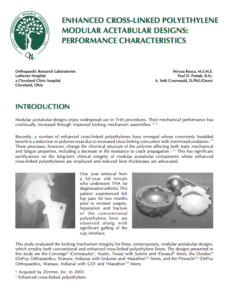 Modular acetabular designs enjoy widespread use in THA procedures. Their mechanical performance has continually increased through improved locking mechanism assemblies. Recently, a number of enhanced cross-linked polyethylenes have emerged whose commonly heralded benefit is a reduction in polymer wear due to increased cross-linking concurrent with minimized oxidation. These processes, however, change the chemical structure of the polymer affecting both static mechanical and fatigue properties, including a decrease in the resistance to crack propagation. This has significant ramification on the long-term clinical integrity of modular acetabular components where enhanced cross-linked polyethylenes are employed and reduced liner thicknesses are advocated. This study evaluated the locking mechanism integrity for three, contemporary, modular acetabular designs, which employ both conventional and enhanced cross-linked polyethylene liners.
Modular acetabular designs enjoy widespread use in THA procedures. Their mechanical performance has continually increased through improved locking mechanism assemblies. Recently, a number of enhanced cross-linked polyethylenes have emerged whose commonly heralded benefit is a reduction in polymer wear due to increased cross-linking concurrent with minimized oxidation. These processes, however, change the chemical structure of the polymer affecting both static mechanical and fatigue properties, including a decrease in the resistance to crack propagation. This has significant ramification on the long-term clinical integrity of modular acetabular components where enhanced cross-linked polyethylenes are employed and reduced liner thicknesses are advocated. This study evaluated the locking mechanism integrity for three, contemporary, modular acetabular designs, which employ both conventional and enhanced cross-linked polyethylene liners.
Enhanced Cross-Linked Polyethylene Modular Acetabular Designs: Performance Characteristics
Mar 8, 2008 | Hip

